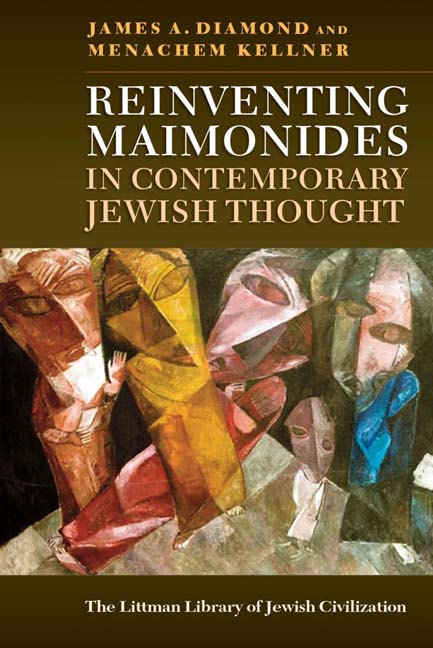Book contents
- Frontmatter
- Dedication
- Acknowledgements
- Contents
- Note on Transliteration
- Introduction
- 1 Rabbi Naftali Tsevi Yehudah Berlin: The Love of Israel versus the Love of the Mind
- 2 Rabbi Joseph B. Soloveitchik and Maimonides
- 3 Rabbi Abraham Isaac Kook and the Mystification of Maimonidean Rationalism
- 4 Maimonides and Rabbi Kalonymus Kalman Shapira: Abandoning Reason in the Warsaw Ghetto
- 5 Rabbi Elhanan Wasserman on Maimonides, and Maimonides on ‘Reb Elhanan’
- 6 Each Generation and Its Maimonides: The Maimonides of Rabbi Aharon Kotler
- 7 What, Not Who, Is a Jew: Halevi–Maimonides in Those Days, Rabbi Aviner and Rabbi Kafih in Our Day
- Afterword
- Bibliography
- Index
7 - What, Not Who, Is a Jew: Halevi–Maimonides in Those Days, Rabbi Aviner and Rabbi Kafih in Our Day
- Frontmatter
- Dedication
- Acknowledgements
- Contents
- Note on Transliteration
- Introduction
- 1 Rabbi Naftali Tsevi Yehudah Berlin: The Love of Israel versus the Love of the Mind
- 2 Rabbi Joseph B. Soloveitchik and Maimonides
- 3 Rabbi Abraham Isaac Kook and the Mystification of Maimonidean Rationalism
- 4 Maimonides and Rabbi Kalonymus Kalman Shapira: Abandoning Reason in the Warsaw Ghetto
- 5 Rabbi Elhanan Wasserman on Maimonides, and Maimonides on ‘Reb Elhanan’
- 6 Each Generation and Its Maimonides: The Maimonides of Rabbi Aharon Kotler
- 7 What, Not Who, Is a Jew: Halevi–Maimonides in Those Days, Rabbi Aviner and Rabbi Kafih in Our Day
- Afterword
- Bibliography
- Index
Summary
THE STORY is told of an east European Jew in the nineteenth century who decided to convert to Christianity. He returns home from the ceremony a Christian in all respects. The next day our former Jew rises early and starts to put on tefillin. His wife yells at him: ‘Fool! Yesterday you converted and today you put on tefillin?’ Our newly baptized Christian smacks himself on his head and expostulates in Yiddish: ‘A goyishe kop!’ (‘What a Gentile head I have!’).
This joke reflects an ideological position which is not at all funny: that non- Jews are more stupid than Jews, and hence, a Jew who converts to another religion lowers his intelligence. This attitude depends upon a more basic view, according to which there is some inherent, even ontological, difference between Jews and all others. According to this view, the gulf between Jew and non-Jew is so deep and broad that it takes a miracle to bridge it (or perhaps it can never actually be bridged).
The view that Jews and non-Jews are distinguished by some inborn, metaphysical quality is widespread in contemporary Judaism, and not only in Orthodox circles. Indeed, this view is so widespread that most people who hold it are actually unaware of the fact that they hold a controversial position, one deeply debated throughout the history of the Jewish tradition, at least from the Middle Ages on. In this chapter, I will seek to illuminate one aspect of this controversy. First I will illustrate the debate as it is expressed by two prominent Israeli Orthodox rabbis, and then elucidate the roots of the debate in the medieval controversy over the nature of Jews and Judaism as found in the writings of Judah Halevi and Moses Maimonides.
Rabbi Shlomo Aviner
In the world of contemporary Orthodox Zionism in Israel (dati le’umi) the voice of Rabbi Shlomo Aviner is heard loudly and clearly, through his many books, lectures, Internet activities, and, especially, the multitude of ‘sabbath leaflets’ (alonei shabat) to which he contributes. Rabbi Aviner was born in France in 1943 and immigrated to Israel in 1966. He earned degrees in mathematics and engineering and is an officer in the Israel Defence Forces reserves. He studied in Yeshivat Merkaz Harav Kook in Jerusalem, and is considered to be a disciple of the late Rabbi Tsevi Yehudah Kook (1891–1982).
- Type
- Chapter
- Information
- Reinventing Maimonides in Contemporary Jewish Thought , pp. 175 - 194Publisher: Liverpool University PressPrint publication year: 2019



